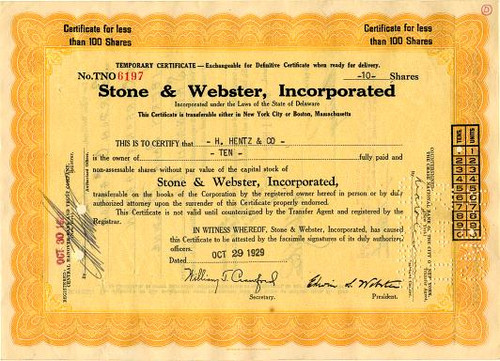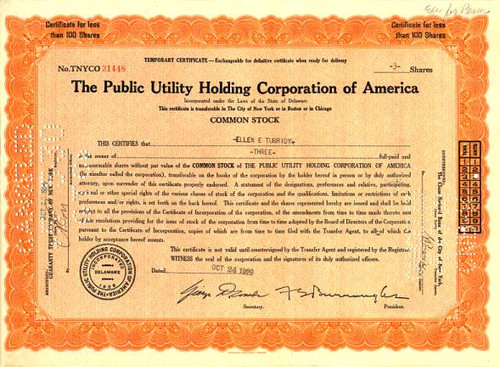Los Angeles - First National Trust & Savings Bank signed by Charles H. Root dated October 29, 1929 (Stock market Crash) - On October 1, 1932, Root threw the pitch that Babe Ruth allegedly predicted he would hit into the seats in the 1932 World Series at Wrigley Field in Chicago (Babe Ruth's called shot). On October 29, 1929, known as ''Black Tuesday,'' the United States Stock Market crashed and sent the US spiraling into the Great Depression. ... This began an economic crisis in the US that would be felt throughout the industrialized world. 
Check signed by Charles H. Root dated October 29, 1929 (Stock market Crash) Charlie Henry "Chinski" Root (March 17, 1899 November 5, 1970) was an American Major League Baseball pitcher with the St. Louis Browns and the Chicago Cubs between 1923 and 1941. Root batted and threw right-handed. He holds the club record for games, innings pitched, and career wins with 201. He was the last player born in the 19th century to pitch in a Major League game. Born on Saint Patrick's Day, Root was the eighth of nine children born to Jacob and Mary Root in Middletown, Ohio. He left school at 13 due to being reprimanded by his teacher for his behavior. His father envisioned his son working in the local steel mill; although he did not get in his son's interest in baseball, he demanded that his son find a job to help the family. Root had numerous jobs, such as driver of a grocery wagon, working in a box factory, and being a pattern-maker at the Armco mill. By the time he was twenty, he was playing semipro ball with the Middletown Eagles, making $5 for each game on Sundays before leaving for the Hamilton Engine Works, who offered $35 a game and a job for $50 a week. Carl Weilman of the St. Louis Browns noticed his play (in which he led them to the Southern Ohio industrial league championship) and signed him to a contract. Root reported to spring training camp for the Browns in Bogalusa, Louisiana in 1921. Root began his professional career on April 18, 1923 with the St. Louis Browns. Root pitched in relief for the final inning against the Detroit Tigers, striking out one while allowing no hits. Root made his first career start on July 4 for the second game of a double-header against the Chicago White Sox. He lasted two innings while allowing two runs on five hits with one strikeout, receiving the loss as the White Sox prevailed 3-1. He would start just one more game that year while appearing in 27 total games, finishing 15 of them while having 60 innings of work, going 0-4 with a 5.70 ERA. He had 27 strikeouts and 18 walks. Root was traded after the 1923 season by manager George Sisler along Cedric Durst, Rasty Wright, and Josh Billings to the Los Angeles Angels in the Pacific Coast League for George Lyons and Tony Rego. In his season with the Angels, he won 21 games in 322 innings. His contract was purchased by the Cubs after the season for $30,000 and two players. He was spent back to the Angels for more seasoning after spring training with the team, winning 25 games with the Angels. In 1926, he began play with the Cubs. In 42 games for the team (starting in 32 of them), he went 18-17 while throwing 21 complete games with two saves and two shutouts in 271.1 innings of work. He had 62 walks and 127 strikeouts, beginning a run of six straight years with over a hundred strikeouts. He finished 16th in the MVP voting that year. For 1927, Root was selected to pitch the Opening Day game for the Cubs, pitching against the St. Louis Cardinals at Wrigley Field, facing future Hall of Famer Grover Cleveland Alexander. Root pitched a complete game while allowing one run on seven hits while having seven strikeouts and five walks as the Cubs rolled over the Cardinals 10-1. That year, he went 26-15 with a 3.76 ERA in 48 games and 309 innings, both career highs. Although he allowed 117 walks, he had 145 strikeouts in the 1,316 batters he faced, all career highs. Fielding-wise, he had six putouts, 49 assists, two errors and two double plays for a .965 fielding percentage. He led the league in wins, games, and innings while finishing in the top ten in hits per 9 innings (8.621, 6th), strikeouts per 9 innings (4.223, 5th), strikeouts (2nd) and shutouts (4, 2nd). Root finished fourth in the MVP voting that year, receiving 46 vote points as Paul Waner received the award with 72. On October 1, 1932, he threw the pitch that Babe Ruth allegedly predicted he would hit into the seats in the 1932 World Series at Wrigley Field in Chicago (see: Babe Ruth's called shot). Root's baseball nickname, "Chinski," was bestowed by his longtime teammate and manager, Charlie Grimm. He is frequently referenced as a source of the name used for "root" system accounts under *BSD operating systems like FreeBSD, OpenBSD and NetBSD, which share the name "Charlie Root." He had a career-low 2.60 ERA in 1933 while winning 15 games. He went to four World Series with the Cubs and lost all four. For his final year in 1941, he went 8-7 with a 5.40 ERA (a career high) while pitching in 19 games, having six complete games in 106.2 innings of work. He allowed more hits and runs than the year before despite a reduced workload while having 46 strikeouts and 37 walks. In his final game on September 2, 1941, he pitched a complete game against the Cincinnati Reds, allowing one run on five hits while striking out and walking five batters in a 3-1 win. As quoted by Baseball Legends: The Charlie Root Story, by Joseph E. Bennett, Jan. 1995 Knight Templar magazine "Root was one of the fiercest competitors the game ever knew... his cigar-chomping, no-nonsense visage was one of the most intimidating tools in his baseball arsenal." Post-career Root also had a long post-playing career as a manager in minor league baseball and pitching coach, serving in the latter role for the Cubs (195153; 1960) and Milwaukee Braves (195657). He was a coach on Milwaukee's 1957 World Series champions. Root, who had a Diamond-R Ranch of 1,000 acres in Paicines, became a cattle rancher who liked hunting and fishing. History from Wikipedia and OldCompany.com (old stock certificate research service).

Check signed by Charles H. Root dated October 29, 1929 (Stock market Crash)








